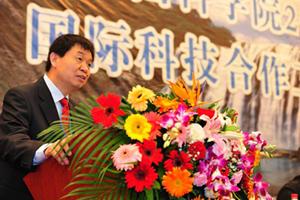"The Chinese Academy of Sciences (CAS) will put into more investment and support to strengthen international cooperation in the next five-year , said Dr. LI Jiayang, CAS Vice President at the CAS Annual International Science and Technology Cooperation Conference held on October 13 in Guiyang, capital city of southwest China s Guizhou Province.
 |
| Dr. LI Jiayang giving an address at the conference. (Image by CAS) |
The CAS will develop long and stable relationship and cooperation with significant international scientific organizations, thus promote bilateral and multilateral scientific cooperation with the research institutes.
Carrying out substantial cooperation in possible areas of the emerging scientific issues and technological revolutions will help the CAS develop key technology and obtain initiative in scientific and technological innovation, said Dr. LU Yonglong, chief of the CAS International Cooperation Bureau, at the conference.
The CAS has gained great progress in international sci-tech cooperation since it launched the Knowledge Innovation Program (KIP) 13 years ago. The 13 years have seen the evolution of CAS international cooperation from simple communication to active initiation and participation, from academic exchange mainly on personnel and information to project based cooperation focusing on research items, from short-term to long-term cooperation, from bilateral to multilateral cooperation, from dispersive to cluster cooperation.
By the end of 2009, there were 10,307 overseas visits of CAS personnel and 17,129 incoming visits to the CAS; 337 bilateral and multilateral meetings were held; and 21 CAS-level international cooperation agreements were signed or renewed to validate a series of international cooperation projects.
"Bygone international cooperation was more like learning from partners, while now situations are changing, said Dr. LU, the CAS international cooperation has turn to equal dialogue with our partners, to substantial research cooperation in joint proposing scientific projects, joint research process and joint supervision of postgraduates.
The next five years will see the CAS deepen its long-term and stable scientific and technological cooperation with developed countries, promoting exchanges and cooperation with developing countries. The CAS plans to broaden information sharing, exchange, personnel training and technology transfer with developing countries in the 12th Five-year Plan period.
Related News
Photos
More>>trade
- Two Chinese Academicians Win Nation's Top Science Prize
- New Long-Tailed Pterosaurs Found in Western Liaoning, China
- Speeding up Electrons in Solar Cells
- IVPP Research Ranks among Discover Magazine's Top 100 Science Stories of 2010
- Advances of Cranial Morphology of Silurian Sarcopterygian Guiyu Oneiros
market
- IHEP and FECO Sign Framework Agreement on Mercury Technology Cooperation
- First Single-fingered Dinosaur Found in Inner Mongolia, China
- A Step towards Highly Efficient, Minimally Invasive and Low Systemic Toxicity
- IVPP's Research Ranks China's Top Ten Science Achievements of 2010
- IVPP Scientists Reveal the Skull of Extinct Birds





